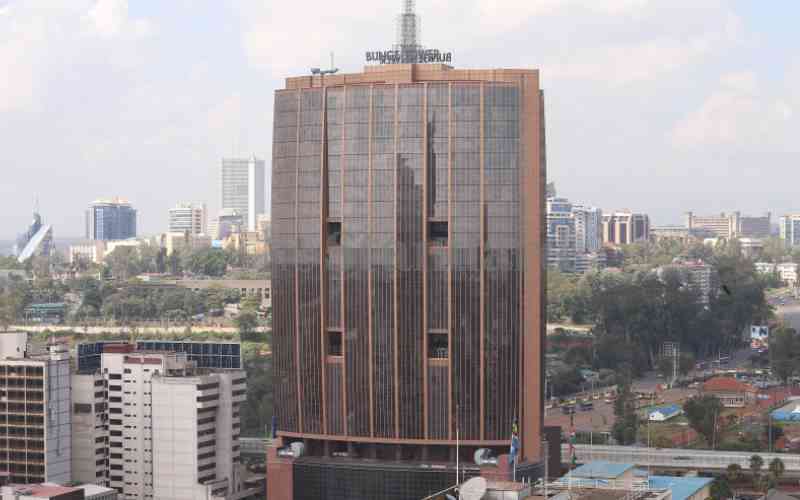 |
|
CIC Chairman Charles Nyachae has said his team would go to court if law on integrity is watered down. |
By Martin Mutua
MPs this week juggle their selfish interests that have seen them water down key integrity and vetting related rules and unrelenting pressure from the public to change course.
Accused of removing hurdles such as vetting which were meant to raise the levels of competence, suitability and uprightness among leaders, Members of Parliament are left with only three days to enact into law six Bills. In every of their step the public will be watching to see which side the MPs will take.
The MPs have only up to the weekend to enact the pending Bills, which include those on national security and war against terrorism, which they have to go through with a fine toothcomb to ensure the changes proposed do not assault the country’s range of freedoms ensconced in the current Constitution under its robust Bill of Rights.
The Bills must be passed and assented to by the President before Monday next week, which might see the House extend its sittings up to the weekend in order to beat the deadline in accordance with the law.
The security Bills include The National Intelligence Security Bill, The National Security Council Bill and Kenya Defence Forces Bill. Others are The Leadership and Integrity Bill, The Assumption of Office of the President Bill and The Petitions to Parliament Bill.
MPs are being accused by civil society groups of having watered down the Leadership and Integrity Bill, which had among other things empowered the Ethics and Anti-Corruption Commission to issue compliance or clearance certificates to candidates.
The original Bill according to the groups that also include the Commission on the implementation of the Constitution mandated other bodies like Kenya Revenue Authority and the Higher Education Loans Board to declare if candidates were up to date on tax payments and university fees loan repayment.
In place of the proposed stringent vetting process, MPs are said to have allowed for candidates only to fill a self-gauging form in which they will be only required to tick ‘Yes’ or ‘No’ against questions themselves.
Double standards
Civil society and other pressure groups are incensed the thresholds the members set for and subjected nominees for other high public service positions won’t apply to them as they seek clearance to run for elective posts next year.
Committee for the Implementation of the Constitution led by Mr Charles Nyachae has already threatened to go to court if the Bill will be passed by the House in its “watered down” state.
At the same time the Parliamentary oversight Committee on the Implementation of the Constitution (CIOC) has organised a half-day workshop for all MPs this morning to chart the way forward.
CIOC Chairman Mr Abdikadir Mohammed told The Standard in an interview the workshop would be to brief members on the progress of the Bills.
“It is, however, disgusting to note that for a Bill to be properly handled it requires a minimum of eight weeks and now we are being called upon to enact six of them in three days, how ridiculous?” he exclaimed.
Stay informed. Subscribe to our newsletter
Abdikadir explained that regarding outrage over the Leadership and Integrity Bill, the committee would be looking at the proposed legislation afresh with a view to incorporating the complaints and proposals from the public.
“There has been this perception that the Integrity Bill had been watered down. We shall look at it together with all the proposed amendments that we have received from the public and civil society groups to find a compromise (position),” he added.
Mr Abdikadir explained that the workshop for members was aimed also ensuring the Bills remain aligned to the Constitution to avoid the risk of them being declared unconstitutional by the courts.
“It is a wrong perception that it is Parliament that delayed these Bills yet the blame needs to be placed on the Executive which caused the mess,” he added.
Abdikadir argued MPs had been wrongly bashed on the matter whereas it was the executive that had dragged its feet.
The CIOC chairman expressed hope the delay in bringing the Bills to the House was not a deliberate move by the Executive to have Parliament “rubber stamp” the legislation they way it wanted.
“It is unfair to the House to expect members to do a better job in three days for six Bills unless it is a deliberate plan by the Executive to have the Bills rubber stamped by Parliament,” he added.
Government co-Chief Whip (ODM) Jakoyo Midiwo said the three days were not sufficient for Parliament pass the six Bills and said the House might be forced to sit up to and including the weekend to clear them. “We require at least one day for each of the Bills to debate and then pass them in the Second Reading. The time is not sufficient and we might be forced to sit up to the weekend,” he added.
“There are people in the Executive who are not interested in proper implementation of the Constitution and these anti-reformists are now running scared,” Midiwo claimed.
Midiwo explained that Parliament was equally embroiled in another mess, as it has to also pass nominees to the National Land Commission by the close of business today in line with the set deadlines.
He argued there had been a wrong perception created within the public that Chapter Six of the Constitution couldn’t function without the legislation that is before Parliament. “Chapter six of the Constitution is as good as established under the Constitution which is supreme and I don’t think we need anything else for it to be enforced,” he added.
Wrong perception
He said the perception also created was that there was need for certain vetting bodies to be included in the Leadership and Integrity Bill.
“This is not true, the vetting clauses are not being created and put in the Bill in order to stall the whole process because the Constitution already has those checks and balances,’’ he went on.
Mr Midiwo argued, for instance, that anybody that who has not paid his or her taxes does not require the Leadership and Integrity Bill to bar them from running as that was a criminal matter which one needs to be taken to court by law enforcers.
The acting chairman of the Justice and legal Affairs committee Njoroge Baiya said the Executive was again to blame for having delayed the Bills.
“As you can see the Executive has resorted to its old habits of bringing the Bills at the last minute but the die is now cast and there is nothing we can do except to deal with those challenges,’ he added.
Mr Baiya said his committee was mandated to deal with Leadership and Integrity Bill as well as the Petitions to Parliament Bill, adding that his team would have loved to have more time to scrutinise the Bills.
“Passage of the Bills will depend on whether we agree during our meeting this morning and be able to come up with a consensus otherwise we are in a crisis,” he conceded.
 The Standard Group Plc is a
multi-media organization with investments in media platforms spanning newspaper
print operations, television, radio broadcasting, digital and online services. The
Standard Group is recognized as a leading multi-media house in Kenya with a key
influence in matters of national and international interest.
The Standard Group Plc is a
multi-media organization with investments in media platforms spanning newspaper
print operations, television, radio broadcasting, digital and online services. The
Standard Group is recognized as a leading multi-media house in Kenya with a key
influence in matters of national and international interest.
 The Standard Group Plc is a
multi-media organization with investments in media platforms spanning newspaper
print operations, television, radio broadcasting, digital and online services. The
Standard Group is recognized as a leading multi-media house in Kenya with a key
influence in matters of national and international interest.
The Standard Group Plc is a
multi-media organization with investments in media platforms spanning newspaper
print operations, television, radio broadcasting, digital and online services. The
Standard Group is recognized as a leading multi-media house in Kenya with a key
influence in matters of national and international interest.










